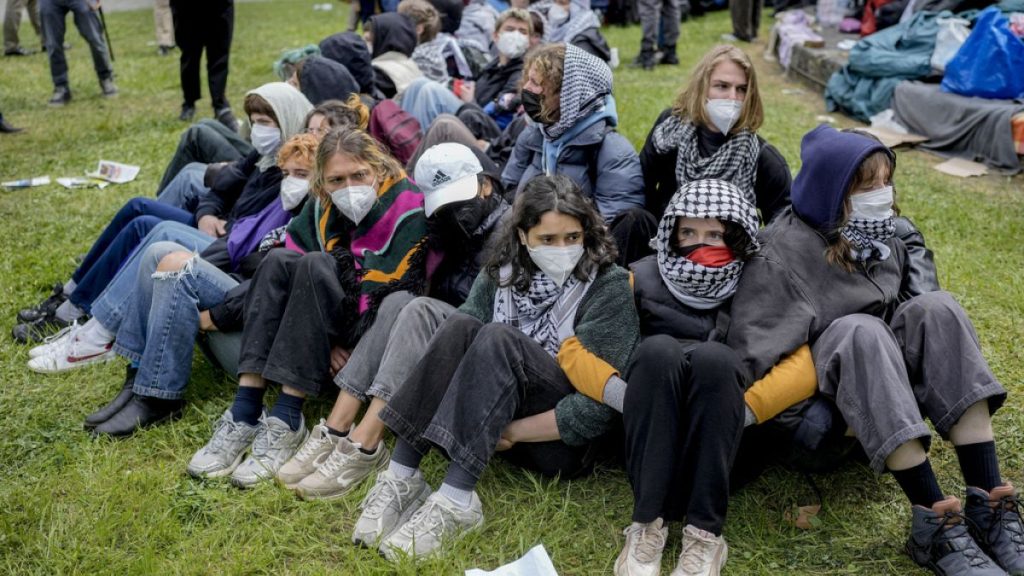Students all over Europe have resumed protesting in support of Palestine as Israel launches a ground assault on Rafah. These protests have been particularly strong in countries such as Germany, the Netherlands, and Austria. In Berlin, protesters at the Freie Universität set up tents and formed a human chain while chanting slogans. Police were forced to intervene and remove some of the protesters. Similar incidents occurred at the University of Amsterdam, where police arrested 125 activists and broke up a pro-Palestinian demonstration camp. Despite these actions, students in various countries continue to hold protests, with police also being called in to shut down protests at Columbia University in New York.
The protests stem from Israel’s rejection of a ceasefire proposal that had been accepted by Hamas, leading to increased conflict in the region. The protests in Europe are a part of a larger global movement that has seen demonstrations and encampments in countries like Finland, Denmark, Italy, Spain, France, and Britain. At the University of Vienna, around 100 people set up a pro-Palestine protest camp, leading to authorities distancing themselves from the action. The protests have sparked a nationwide debate over the limits of the right to protest, with police actions at Columbia University in New York and elsewhere coming under scrutiny.
The resurgence of pro-Palestinian protests in Europe represents a renewed wave of support for Palestinians amid escalating violence in the region. The protests have been fueled by Israel’s ground assault on Rafah and its rejection of a ceasefire proposal, in addition to continued tensions between Israel and Hamas. Students have taken to the streets and set up camps at various universities, with police intervening to quell demonstrations in some cases. Despite these interventions, protesters remain steadfast in their support for Palestine, with demonstrations spreading across multiple countries in Europe and beyond.
The protests at universities in Germany, the Netherlands, and Austria have been marked by students setting up tents, forming human chains, and chanting slogans in support of Palestine. Authorities have been forced to arrest activists and break up demonstration camps, leading to conflicts between protesters and the police. The protests have become a focal point for debate over the limits of the right to protest, with actions at Columbia University and elsewhere sparking a nationwide discussion about the right to demonstrate. Despite these challenges, students in various countries continue to stand in solidarity with Palestine and voice their opposition to the ongoing conflict in the region.
The protests in Europe come at a time of renewed tension and violence in the Israel-Palestine conflict, with Israel’s ground assault on Rafah and its rejection of a ceasefire proposal leading to increased conflict in the region. The protests at universities in Europe are part of a broader global movement that has seen demonstrations and encampments in multiple countries. Despite police interventions and challenges, students remain resolute in their support for Palestine, with protests spreading across different countries including Finland, Denmark, Italy, Spain, France, and Britain. The protests have reignited debates about the right to protest, with actions at universities like the University of Vienna and the University of Amsterdam drawing attention to the ongoing conflict and the need for a peaceful resolution.
Overall, the pro-Palestinian protests in Europe reflect a broader global movement in support of Palestine amid escalating violence and tension in the region. The protests have been marked by students holding demonstrations, setting up camps, and clashing with police in some instances. Despite challenges and interventions by authorities, students remain committed to showing solidarity with Palestine and voicing opposition to the ongoing conflict. The protests have sparked debates across different countries about the right to protest, with actions at universities like the Freie Universität in Germany and the University of Amsterdam in the Netherlands drawing attention to the plight of Palestinians and the need for a peaceful resolution to the conflict.


